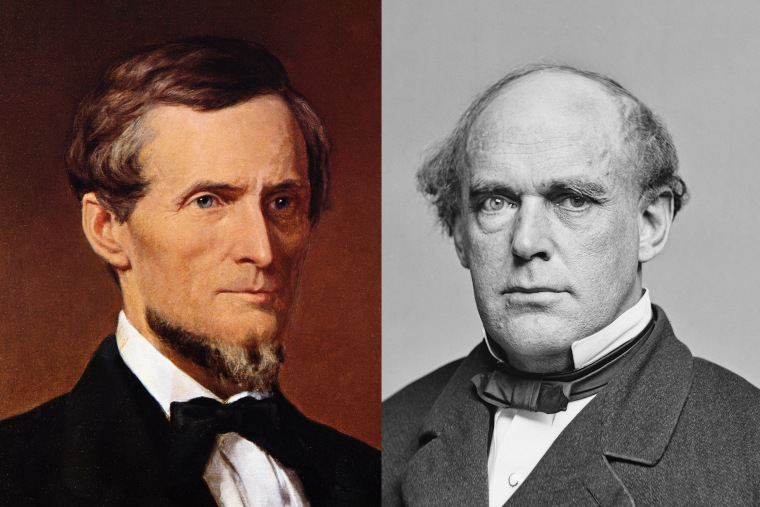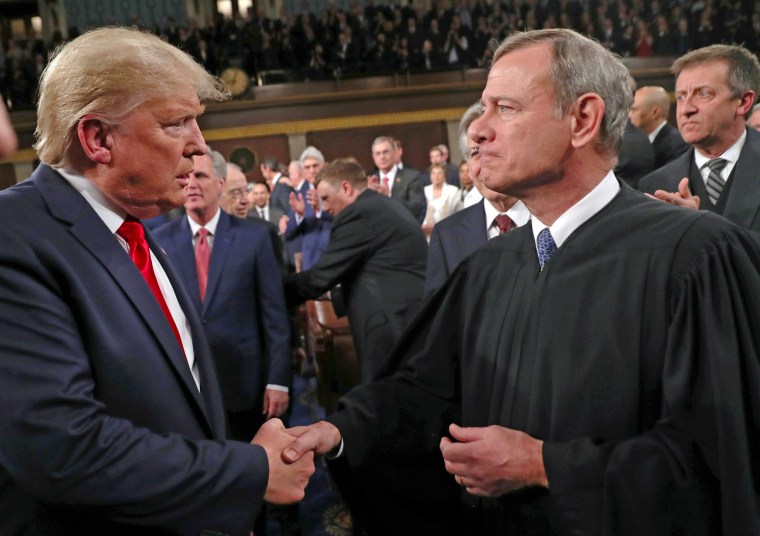WASHINGTON — It was in a packed courtroom in Richmond, Virginia — the former capital of the Confederacy — in December 1868 where Chief Justice Salmon Chase concluded that Jefferson Davis, the defeated rebel president, should not face prosecution for treason.
Little would anyone have known at the time that Chase’s decision — in addition to another one he authored the following year touching upon the same legal issue but reaching a different conclusion — would re-emerge from the mists of history to play a role in the ongoing dispute over whether former President Donald Trump should be barred from office.
Both Chase cases — the other concerned a Black man seeking to throw out his criminal conviction — feature in court filings ahead of the Supreme Court’s oral argument in Trump’s case next week. In each instance, Chase was sitting on a lower court so was not acting in his role as chief justice of the Supreme Court.
Both include a rare contemporary discussion of Section 3 of the then-recently enacted 14th Amendment to the Constitution.
The provision was intended to prevent former government officials who joined the Confederacy from holding office after the Civil War. It states that those who previously took an oath to support the Constitution and then “engaged in insurrection or rebellion” are no longer qualified to serve again.
Chase’s rulings have taken on new relevance as the Supreme Court hears Trump’s plea that he not be removed from the Republican primary ballot in Colorado. He is seeking to throw out a Colorado Supreme Court ruling that said he is ineligible under Section 3 because of his role in seeking to overturn the 2020 presidential election results in a series of events that led to the Jan. 6, 2021, attack on the Capitol.
“I don’t know that any one case or any one justice from the past is going to be the dominant kind of theme or a talisman that the court looks at,” said Vikram Amar, a professor at the University of California Davis School of Law, who filed a brief that mentions Chase’s rulings.
But, he added, “If you’re trying to convince people about the understanding of the day, you want to make sure that you’re addressing what prominent people said and did back then.”
The history is relevant in part because several members of the conservative-majority Supreme Court put considerable weight on how people would have understood constitutional provisions at the time they were written.
Chase, who had his own ambitions to be president, was an anti-slavery Republican former governor of Ohio whom President Abraham Lincoln appointed to the Supreme Court in 1864. Even as chief justice he eyed the presidency, and historians say his rulings are inflected with political considerations.

At the time Davis’ case was before him, Chase was trying to win the Democratic nomination for president, although that effort had failed before he voted against proceeding with the prosecution.
Cynthia Nicoletti, a professor at the University of Virginia School of Law who wrote a book about Davis’ prosecution, said in an interview the argument adopted by Chase in the Davis case was a “weird one” that seems driven by political expediency.
“I do think it’s a clever maneuver for Chase to get rid of the case,” she said.
Chase appeared to embrace an argument made by Davis’ lawyers that Section 3, which clearly applied to the former Confederate president, was a form of punishment, thereby barring any criminal prosecution.
The lawyers argued Section 3 was “self-executing,” meaning that it automatically applied to Davis without the need for Congress to pass any legislation to enforce it.
Historians have concluded that Chase himself had suggested privately that Davis’ lawyers make that argument.
But just the following year, Chase took the opposite approach in another case in Virginia, this one involving a Black criminal defendant, Caesar Griffin, who argued that his conviction for “shooting with intent to kill” should be thrown out because the judge who presided over his case was a Confederate.
Section 3 applied to the judge because he had previously made an oath to support the Constitution as a member of the Virginia state legislature, Griffin argued.
This time around, Chase ruled that “legislation by Congress is necessary” for someone to be disqualified under the 14th Amendment, in part because of the far-reaching consequences of invalidating thousands of decisions made by officials with similar Confederate backgrounds to the judge in Griffin’s case.
The question of how exactly Section 3 can be enforced is one of several legal issues raised in Trump’s case, which could have far-reaching consequences if other states could then follow the lead of Colorado and remove him from the ballot.
Trump’s lawyers cite Chase’s ruling in the Griffin case in their briefing, saying that it helps confirm “congressional enforcement legislation as the exclusive means for enforcing Section 3.” It is just one of several arguments they make in saying that the Colorado ruling should be overturned.
The plaintiffs — six Colorado voters — responded in their own brief that Chase’s opinion is “non-binding” and “does not credibly support the claim that Section 3 is unenforceable here.”
They also pointed out Chase’s “contradictory position” in the Davis case.
The Colorado Supreme Court said Chase’s ruling in what has been dubbed “Griffin’s Case” was not persuasive, but Justice Carlos Samour relied on it heavily in his dissenting opinion.
“I consider the holding in Griffin’s Case compelling,” he wrote.
Josh Blackman, a professor at South Texas College of Law who filed a brief backing Trump, feels the same way, arguing that the Griffin ruling effectively settles the issue of how Section 3 is enforced.
If the Supreme Court is looking for a way to resolve Trump’s case without delving into the meaning of “insurrection” under Section 3, “I think Griffin’s Case is one way of doing it,” he said. Chase’s vote in the Davis case carries less weight, Blackman added, in part because a full account of the ruling was only published years later.
Other legal experts strongly disagree with Blackman’s reliance on the Griffin ruling.
“Chief Justice Chase was not shooting straight” when deciding either case that touched upon Section 3, William Baude and Michael Paulsen wrote in an influential law review article that argued the provision is self-executing.
Ellen Connally wrote a lengthy article on Davis and Chase when she was studying for a Ph.D. in history at the University of Akron 20 years ago. Like Nicoletti, her work is cited in briefs filed in the Trump case.
Connally thinks the court should look closely at the history but conceded that in the Davis case, “Chase was just looking for this loophole” to avoid some difficult legal questions that would arise if the case went forward, she said.
Chase’s ruling ended up having little practical impact.
He was sitting as part of a two-judge panel, and the other judge did not believe the prosecution should be quashed. Because of the tie vote, the case under the rules that existed at the time was initially heading toward Chase’s own Supreme Court.
But then there was another twist. On Dec. 25, 1868, outgoing President Andrew Johnson announced an amnesty that applied to all Confederates, including Davis.
The prosecution was dropped.

